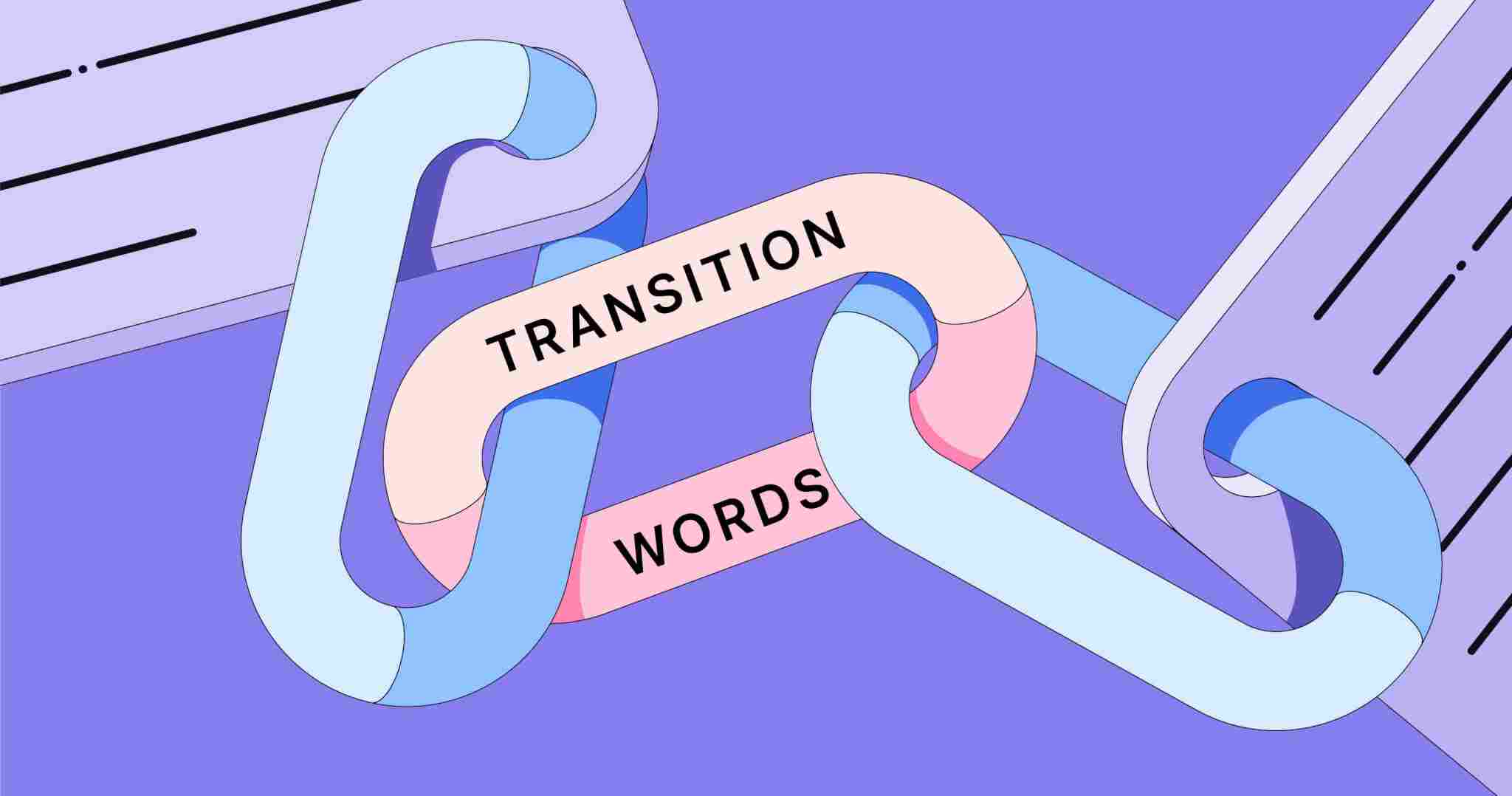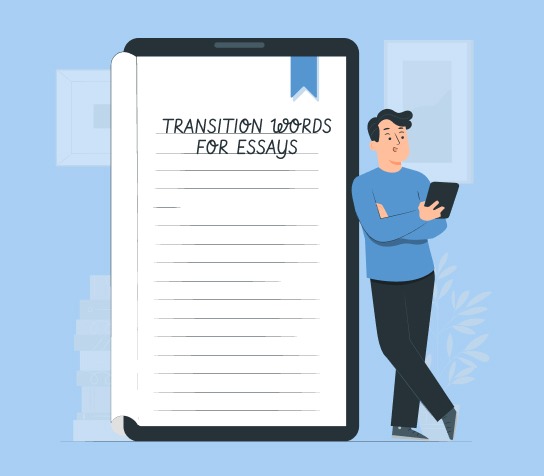150+ Transition Words for Essays to enhance your writing
Published 06-16-2023
30121

150+ Transition Words for Essays
Do you need some essay transition words that will definitely make your writing flow? We have got you covered at Literary Owls!
Scholars, researchers and students often use transition words in their essays, papers, projects and assignments. However, determining which words to use and where to place them in essays, research and other papers can be challenging. For scholars and students, thinking of new transition words other than the usual "and," "but" and “however" can be especially difficult.
Fortunately, Literary Owls is always available to provide you with the necessary paper writing advisory, resources and tools to enhance your writing. At Literary Owls, we understand transitional words and phrases, how to use them in different parts of your essay, and how to generate the proper impression in your academic and general scholarly writing.
In this article, we have compiled a comprehensive list of 150+ transition words that will help you in writing your scholarly projects such as research papers and general coursework. Also, this article provides you with other helpful tactics and hints.
What do we mean by transition words?
Let's begin with the most basic concept of defining transition words. Transition words refer to words and phrases used in connecting sentences. Their functions resemble those of conjunctions in that they connect sentences and help your academic writing to flow smoothly. You wouldn't speak to someone in very short or choppy sentences. So, why would you write in that manner?
Commas, semicolons and colons are commonly used after transition words, especially if the two sentences are full. In this case, they are used to link sentences as opposed to using periods to separate them. This way, a strong between thoughts is created. Literary Owls encourages the correct use of transition words to bring out an appealing touch to your writing while ensuring that your writing is properly formatted so that you do not lose marks on technical aspects.
When coming up with any type of scholarly or academic writing, such as essays, be sure to use transition words at the beginning of each body paragraphs as this not only helps in continuing into your next thoughts but it also assists in introducing the next point to be made.
Why do I need to use transition words?
In as much as your sentences appear to be acceptable without transition words, transition words make a whole lot of a difference in your writing when you use them. Transition words and phrases make your sentences have a nice flow by creating a sense of connection between your ideas and thoughts, hence making essays more cohesive and easier to read for your professor.
Consider the following sentences: "LeRoy failed his math assignments throughout the semester." He ultimately failed his math class." Now consider these sentences, each with a transition word: "Throughout the semester, LeRoy failed his math homework. As a result, he ultimately failed his math class." As you can see, using a transition word between the two phrases allows them to flow together and connects the idea that one thing led to another. That is, LeRoy’s failure of his math homework throughout the semester led to his failure of a math class.
This goes to show that when you employ transition words in essays, you improve the flow of your writing and make it easier to relate one point to another. This is especially vital near the end of your body paragraphs, when you must transition from one topic to the next in a seamless manner. Think of sentences in your academic writings such as essays and term papers as a wall of bricks. Ideally, one cannot pile bricks without mortar holding them together. As in a brick wall where mortar holds the bricks together to create something more solid structure, transition words work the same ways as mortar. Yes, your sentences can stand on their own but, transition words connect them to form a more cohesive composition as a whole.
What are the types of transition words?
Transition phrases and words can be classified into various groups, mainly in terms of the words’ or phrases’ usage and purpose.
- Time, Location or Place/ Space

- Emphasis, Support or Examples
- Cause and Effect
- Similarity, Addition or Agreement.
- Opposition or Contradiction
- Order or Sequence
- Summary, Clarification or Conclusion
From the preceding, transition phrases and words are often classified into various groups, often due to their usage and purpose. For instance, transition words from the "agreement, addition or similarity" group are used in instances where additional statement are to be included where some arguments have already been made. Of course, you are not restricted from using transition words and phrases in any way you feel is best suited and not necessarily limited to the aforementioned categories. Literary Owls has provided these lists, however, with the intention of serving as a guideline to assist scholars, researchers and students in selecting the appropriate word to make their writing and thoughts to flow seamlessly. The use of an inappropriate transition word in a given context can cause an essay or paper to completely change course.
It all comes down to relationships
Literary Owls recognizes and understands the need for scholars, researchers and students to keep in mind that transition words and phrases are determined by the relationship between two points or ideas. There are various forms of relationships between ideas and/or words, just as there are various types of ties between individuals. This is when the many classifications stated earlier come into play. A transition word, for instance, used at the end of one body paragraph before moving on to the next demonstrates how one topic is leading into another. In this regard, a cause-and-effect relationship manifests in that one idea is a result of the previous. This can also imply an agreement relationship, whereby one element contributes to another.
To drive this point home, consider the following sentence-to-sentence cause-and-effect relationship:
“My father drank for over 40 years. As a result, in his 70s, he got diabetes and hypertension.”
In this case, “as a result” is used as a transitional phrase to imply that the grandfather's diabetes and hypertension was caused by his long-term consumption of alcohol.
150+ effective essay transition words
It is critical to use appropriate transition words and phrases in the right places when it comes to transition words for essays, papers, research and all other academic writing projects. Joe Schall, a professor in the College of Earth and Mineral Sciences at Pennsylvania State University, suggests employing transition words in "pivotal positions" where the meanings of sentences change.
As a scholar, researcher or student, your supervisor will grade your essays and other scholarly and academic writing projects based how logically or cohesively communicate your thoughts, ideas, and arguments. If writing a narrative, argumentative, persuasive, compare and contrast, rhetorical/literary criticism, personal narrative or literary analysis essay, for instance, you must constantly be able to communicate your thoughts in a way that your supervisor, or any other reader, can easily understand.
If you are stuck for ideas or need some new inspiration, you have made the right decision by coming to Literary Owls. In this article, we have compiled a list of 150+ transition words for essays to help you find the proper words for your essays and other scholarly and academic writing projects.
Time, Location or Place/ Space |
Emphasis, Support or Examples |
Cause and Effect |
Similarity, Addition or Agreement |
Opposition or Contradiction |
Order or Sequence |
|
|
|
|
|
|
|
|
Where to use transition words in your essays
You have now understood the words to use to transition between ideas and points, courtesy of Literary Owls. However, we understand that you may still have a few questions. For instance, you are possibly in a limbo regarding where to employ transition words in your academic writing. To address this and other concerns that you may have, here are a few different areas where you can use transition words essays, papers, projects and assignments.
● At the start of the introduction or summary paragraphs.
● In topic sentences at the beginning of each paragraph.
● In closing sentences at the end of the paragraph to introduce the next paragraph.
● To link evidence to the argument or result.
● In the conclusion to summarize the main points.
Check out the Literary Owls Blog for more tips on how to write A+ essays, papers, projects and assignments. We have a series of articles aimed at guiding you on exactly what should you should include in each component of your essay so that you can be confident you are on the right track for scholarly and academic success.
Important things to keep in mind
If you still have questions, here are some tips to help you while using transition words in essays.
- Avoid using transition words excessively in your writing. You need them in strategic places, but not in every single line. If too many transition words are used, your supervisor and/or reader may get the impression that you are not giving them enough credit for making obvious connections.
- Make certain that you comprehend the word you are using. The purpose of a transition word is to build a logical connection and, as such, the logic may be completely lost incorrect words are used as transition words in sentences.
- Understand how to begin sentences since most transition words used at the beginning of sentences can be too informal for an academic writing. As such, they should be avoided at all costs. For instance, transition words such as “and,” “but” and “because,” among others, should not be used to begin a statement. Instead, a more formal and appropriate transition words should be used in such critical positions.
- Keep an eye out for sentence fragments. It is so simple to write sentence fragments with transition words and not notice they are not complete sentences since we are so used to expressing them in everyday conversations. Ensure that each sentence used in essays, papers, projects and assignments can stand on its own.
- An essay outline is critical to organizing your essay, paper, project and assignment writing. This not only gives you a clear understanding of where and when you should include transition words but also allows you to avoid overusing them where they are not necessary.
Still confused about how to use transition words in essays? Allow us to assist you.
If you have read this article and still have issues using transition words in your essay, paper, project and assignment writing, then it is time to buy Literary Owls’ academic and scholarly writing advisory services. Our team of experts, to whom we fondly refer as our night owls, are ready and willing to provide you with custom paper and essay writing advisory service.
So, you do not have to waste time thinking about the appropriate transition words to use. Our night owls are capable of providing the highest quality essay and manuscript preparation, writing, proofreading and editing for you in all types of academic writing, from literature reviews, expository essays and theses to dissertations, movie reviews and book reports. Our night owls will find all the words to make your arguments, and you will not have to type a single one of them!
Buy Literary Owls’ academic and scholarly writing advisory services right away using our simple and quick form, or request a free tailored quote for your next writing job!




